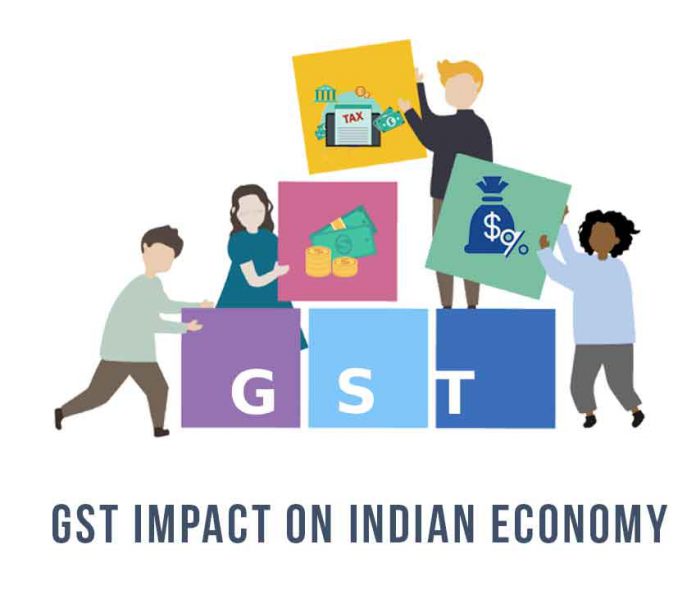GST came into effect from 1 July 2017 under Prime Minister Narendra Modi’s government, which was started to impose on the supply of goods and services across India (except few places). GST is defined as Goods and Service Tax, which was a replacement to existing indirect taxes like excise duty, Service Tax, VAT, etc. GST in India was introduced to reduce the tax burden from both companies and consumers. Before the implementation of GST, consumers paid more for goods and services. Because under the previous system, there were many taxes in each stage and there was no benefit of tax paid in the previous phase.
Impact of GST on Indian Economy
GST is a game-changing reform for the Indian economy, as it will bring goods and services at reasonable prices.
- Competition will Increase: Goods and services manufactured before GST attract around 25–30% tax. After GST is implemented, the burden of paying taxes will be passed on to the end consumer which reduces the tax liability of the manufacturer. This increases production hence increases competition.
- Simple Tax Structure: There are many taxation systems under different stages of the supply chain before GST, GST is one tax system and the calculation and filing of taxes under GST are very simple.
- Uniform Tax Regime: Earlier, there were many taxes like service tax, VAT etc., which make the tax so complex and taxpayers often get confused between different taxation systems. GST is one tax system, it is easy to understand.
- Increase Tax Revenue: By simplifying the structures, GST will encourage compliance, this increases the number of taxpayers and, in turn, the collection of tax revenue will increase for the government.
Impact of GST on various Sectors
- Financial Products and Services: Financial services such as banks, insurance and non-banking financial companies will be affected the most.
- Other Service Sector: In the Indian economy, the services sector contributes more than 55%. GST will reduce the tax burden in the service sector due to the absorption of multiple taxes.
- Start-Ups: GST has a positive impact on start-ups. Tax credits on purchases, free flow of goods and services, and a simple taxation system can help startups. Although startups in India are already facing a lot of stress, it is difficult to tell how the new GST rules will affect them.
- Manufacturing Industry: GST asks industry to have a set-up mechanism to meet the requirements. Therefore, when companies adapt to the requirements, compliance costs will fall drastically.
- Automobile Industry: GST absorbed indirect taxes such as excise, VAT, sales tax, road tax, motor vehicle tax, registration fee on the sale of vehicles spare parts and accessories.
- Chemical Industry: The implementation of GST is believed to be positive for the chemical industry, especially in the long term.
- Tobacco Industry: With the new GST rates, the effect on the tobacco industry is going to be largely neutral compared to the combined taxes during the pre-GST regime.
- Aviation Sector: The industry has expressed mixed feelings about the introduction of GST, new tax rates will impact on airline fuel and airfare.
- Cement Industry: GST could affect the industry, as higher rates of tax mean an increase in the cost of cement production.
- Digital Advertising Industry: This industry which is growing rapidly under various states and jurisdictions will have some difficulty under GST as compared to traditional marketing but will not have much effect.
- Handicraft Sector: One of the largest sectors of the country, which is most affected by GST. Therefore, GST is not welcomed by the artisans.
- Textile Industry: Despite some changes under the GST regime, the textile sector benefited with the implementation of the regime. As GST reduced the input cost of the industry
- Tourism & Hotel Industry: GST is a silver lining for the hotel and tourism industry. GST with uniform tax rates, better use of input credit will benefit the end-user in the event of an impact.
- Alcohol Industry: There is GST on alcohol, due to which there is an increase in the price of alcohol.
- Pharmaceutical Industry: The implementation of GST is believed to be positive as GST has absorbed various taxes levied on the industry.
- Real Estate Sector: The implementation of GST has mostly benefited the sector, as the sector is becoming more transparent. But we cannot fully assess it because it depends entirely on the tax rates.
- E-Commerce: GST proposes the “Tax Collection at Source (TCS)” mechanism. In which e-commerce operators in the form of TCS are required to collect 1% of the net worth of taxable supplies.






































